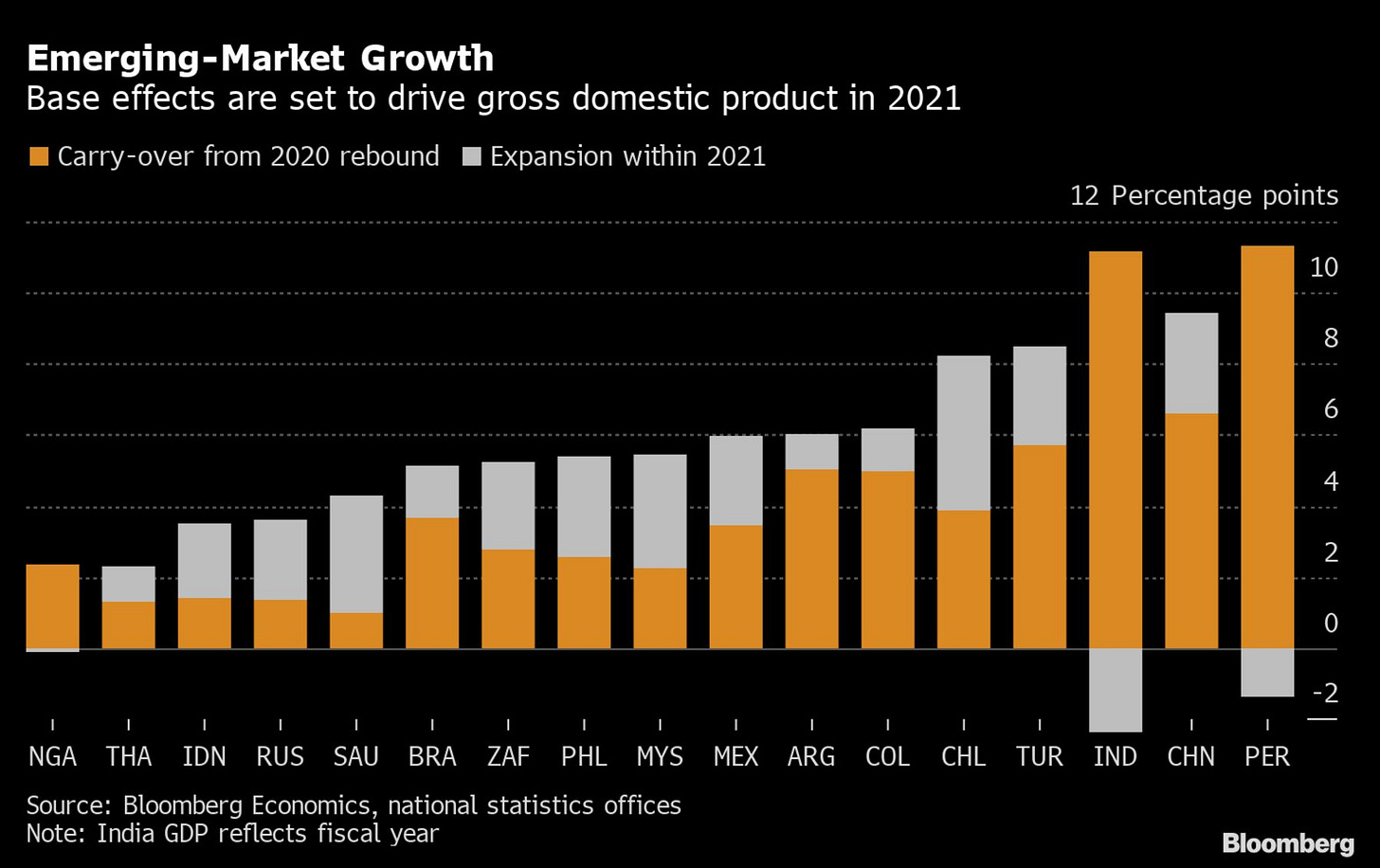Emerging Markets Daily - June 29
Tencent Losing Chinese Investors, Vietnam Robust Growth, Chart: EM Recovery At Varying Speeds, Ethiopia Ceasefire, Panama Canal and Climate Change, and More
The Top 5 Emerging Markets Stories from Global Media - June 29
Tencent Losing Its Biggest Supporters: Chinese Investors
Bloomberg
“Tencent Holdings Ltd.which has lost more than a fifth of its market value in the past few months, now appears to be losing its biggest supporter: Chinese investors.”
“Mainland traders have sold a net HK$11.2 billion ($1.4 billion) worth of Tencent shares so far in June, exchange data compiled by Bloomberg show. This would mark the first month of outflow for the $730 billion internet giant via the trading link with Hong Kong since May 2020.”
“After rising to within a whisker of joining the trillion-dollar club earlier this year, Tencent began to slip as investors grew concerned about valuations and moves by the People’s Bank of China to reign in pandemic easy-money policies. With antitrust watchdogs probing alleged monopolistic behavior by the country’s internet titans over the past few months, the stock is now down 23% from its January record high.”
“Loss of support from mainland investors, who account for almost a third of Tencent’s daily turnover, could signal that the worst is not yet over.” Jeanny Yu reports.
Vietnam's GDP Grows 6.6% in April-June Despite COVID Outbreaks
Nikkei Asia
“Vietnam's gross domestic product increased 6.61% on the year in the April-June quarter, illustrating the nation's economic recovery, the government said Tuesday.”
“The Southeast Asian country's economy continues to grow on strong exports of smartphones and other products, despite successive COVID-19 outbreaks among factory workers in northern Vietnam.”
“The economy expanded 5.64% in the 1st half, marking a jump from 1.82% in the same period a year ago, according to the General Statistics Office. Though the rate fell short of the 7% projection by VNDirect Securities, it confirmed Vietnam's high potential growth.” Tomoya Onishi reports
Featured Chart: Emerging Market Recovery At Varying Speeds
Bloomberg Economics
Ziad Daoud and Scott Johnson write: “Taken together, major emerging-market economies have already surpassed their pre-virus peak. Individually, they’re recovering at different speeds, depending on virus containment, trade, commodities, capital flight, and a low base of comparison with the pandemic recession.”
“Bloomberg Economics expects gross domestic product in major emerging markets to expand 8% in aggregate this year after contracting 1.1% in 2020. Excluding the impact of base effects, commodity exporters such as Chile and Saudi Arabia are set to outperform their peers.”
Ethiopia's Tigray Conflict: Unilateral Ceasefire Declared after Rebels Retake Capital
BBC
“Ethiopia's government has declared a ceasefire in its war-torn Tigray region, as rebel fighters claim control of the regional capital Mekelle.”
“…The Ethiopian government has not confirmed the loss of the city, nearly eight months after its forces ousted the Tigrayan rebels.”
“The conflict has pushed the region into a deep humanitarian crisis. More than five million people are in urgent need of food aid, the United Nations says, with 350,000 facing famine.”
“…Ethiopia's government is yet to comment on reports that its troops have been pulled out. But in a statement on state TV, it said the ceasefire would ‘stay until the farming season ends’ to allow aid to reach those in need and give space to find a political solution.”
“The TPLF has not commented on the ceasefire.” BBC News reports
Panama Canal Tackles Climate-Change Puzzle
The Wall Street Journal
“The Panama Canal faces a creeping threat from climate change, including droughts so intense that ships sometimes reduce their cargo so as not to run aground, and giant storms that almost overwhelm its dams and locks, canal officials say.”
“…But the Panama waterway faces more serious long-term challenges that could also disrupt global shipping. The biggest problem is diminishing rainwater needed to operate the 50-mile waterway, through which 4% of global trade passes. Four of the past seven years have been among the driest since 1950, according to estimates from the state-run Panama Canal Authority.”
“…Canal authorities are working on a $2 billion plan to build infrastructure to manage and preserve freshwater reserves—an amount equal to the canal’s annual contributions to Panama’s government coffers. On Monday, officials said they would choose from among 30 proposed solutions and put those out for bids in about two years.” Santiago Perez reports
What We’re Also Reading…
Cuba's COVID Vaccine Rivals BioNTech-Pfizer, Moderna
DW
“In a measure of its ambitious efforts to be vaccine self-reliant, Cuba has named one of its homegrown jabs Abdala, after a famous dramatic verse by independence hero and national icon Jose Marti. In the verse, the young hero, Abdala, heads to war to defend his fatherland, full of patriotic fervor no matter how strong and powerful the enemy.”
“…According to the state-run biotech corporation, BioCubaFarma, Abdala has proven about 92.28% effective against COVID-19 in clinical trials, which would put it the same league as the most effective vaccines BioNTech-Pfizer and Moderna. Huge applause erupted in the auditorium of the CIGB this week when the impressive results were announced.”
“…The government vaccination program was rolled out in mid-May with Abdala and the second homegrown vaccine, Soberana 2, even before the completion of the third phase of clinical trials. These are the first vaccines on the island since Cuba declined importing any shots from Russia or China. Cuba has also decided against joining the UN-backed COVAX initiative, a global project aimed at getting COVID-19 shots to countries regardless of their wealth.” Oliver Pieper reports
The Chinese Women Desperate to Keep Working but Forced to Retire
Financial Times
“China’s female professionals are challenging the world’s lowest retirement age as Beijing grapples with balancing the needs of an ageing workforce and youth unemployment.”
“Court records reveal that Chinese women have sued their employers more than 1,000 times since 2019 for making them quit work at 50, while their female colleagues in management positions can stay on until the age of 55. In the decade before 2019, there were fewer than 800 such cases.”
“…The surge in retirement disputes highlights China’s demographic quandary: the country’s population is ageing and its birth rate is declining, creating an economic time bomb. At the same time, the government is striving to meet ambitious economic growth targets as state pension funds run perilously low.” Sun Yu reports





